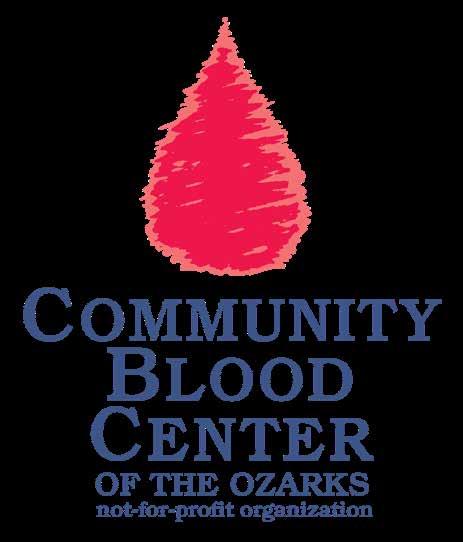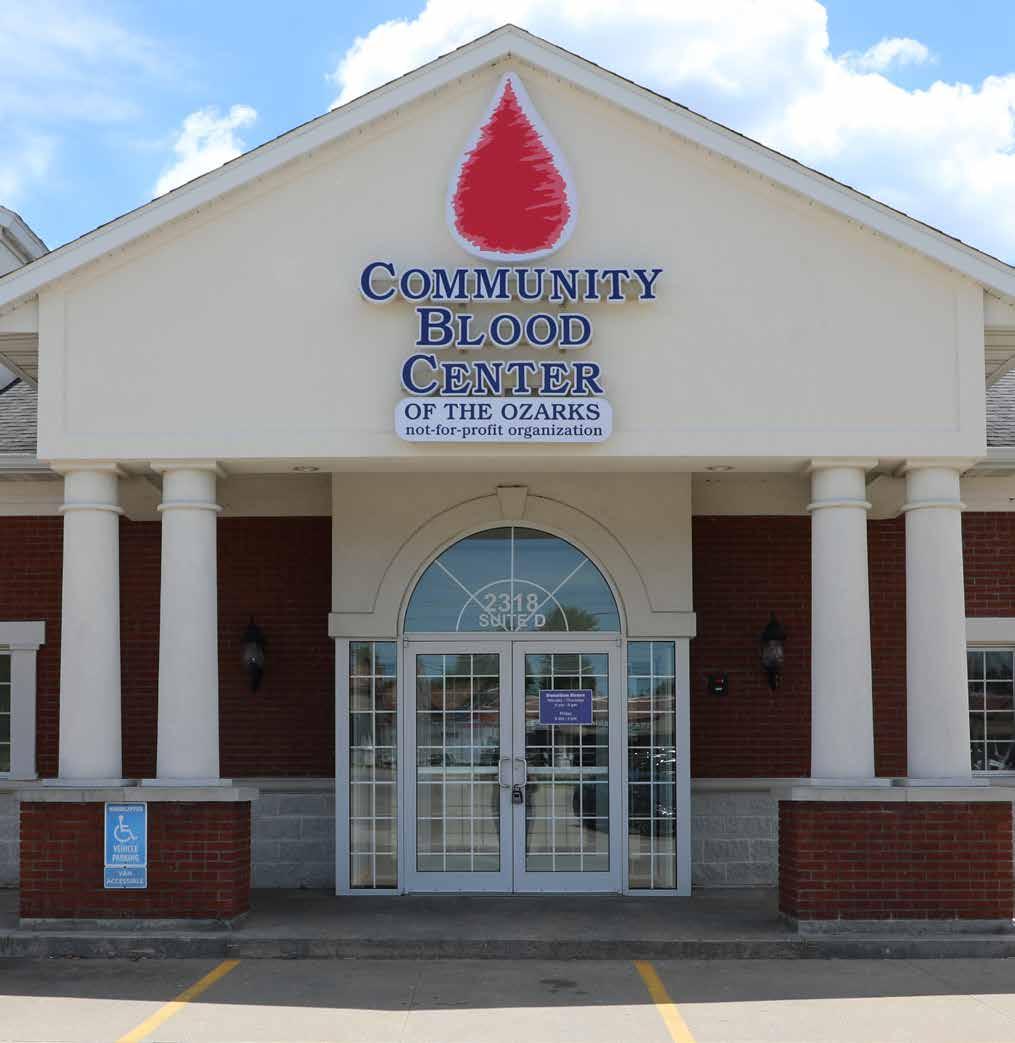














Community Blood Center of the Ozarks (CBCO) is pleased to offer a full benefits package to help protect your well-being and financial health. Read this guide to learn about the benefits available to you and your eligible dependents starting January 1, 2026.
Each year during Open Enrollment, you may make changes to your benefit plans. The benefit choices you make this year will remain in effect through December 31, 2026. Take time to review these benefit options and select the plans that best meet your needs. After Open Enrollment, you may only make changes to your benefit elections if you have a Qualifying Life Event.
Your benefits program offers two medical plan coverage options. To help you make an informed choice and compare your options, a Summary of Benefits and Coverage (SBC) document for each plan is available in Employee Navigator or by contacting Human Resources.
Stacey Connell, Sr. Director of HR
Chris Stovall, HR Generalist II
Lauren Pyle, HR Generalist I

417-227-5313 417-227-5314
417-227-5306
connells@cbco.org stovallc@cbco.org pylel@cbco.org
If you (and/or your dependents) have Medicare or will become eligible for Medicare in the next 12 months, federal law
Please see page 21 for more
You are eligible for benefits if you are a regular, full-time employee working 30 or more hours per week. Your coverage is effective on the first of the month following 60 days of employment. You may also enroll eligible dependents for benefits coverage. The cost for coverage depends on the number of dependents you enroll and the benefits you choose. When covering dependents, you must be enrolled in the same plans.
• Your legal spouse
• Children under the age of 26, regardless of student, dependency, or marital status
• Children over the age of 26 who are fully dependent on you for support due to a mental or physical disability, and who are indicated as such on your federal tax return
Once you elect your benefit options, they remain in effect for the entire plan year until the following Open Enrollment. You may only change coverage during the plan year if you have a Qualifying Life Event, some of which include:
• Marriage, divorce, legal separation, or annulment
• Birth, adoption, or placement for adoption of an eligible child
• Death of your spouse or child
• Change in your spouse’s employment status that affects benefits eligibility
• Change in your child’s eligibility for benefits
• Significant change in benefit plan coverage for you, your spouse, or child
• FMLA leave, COBRA event, judgment, or decree
• Becoming eligible for Medicare, Medicaid, or TRICARE
• Receiving a Qualified Medical Child Support Order

If you have a Qualifying Life Event and want to change your elections, you must notify Human Resources and complete your changes within 30 days of the event . You may be asked to provide documentation to support the change. Contact Human Resources for specific details.
New Hires: You must make your elections to enroll in or waive benefits within 60 days of hire via Employee Navigator. Coverage is effective on the first of the month following 60 days of employment. At your initial eligibility, you may elect voluntary life in the amount of five times your earnings or $100,000 without submitting proof of good health. Consider how much you want to contribute if participating in the health care or dependent care Flexible Spending Account (FSA), or both.
Existing Employees: You may enroll in or change benefit elections only at Open Enrollment or when you have a Qualifying Life Event. Review your current benefits to see if any changes need to be made to coverage for you or your covered dependents, and confirm that your personal information is current in the system (e.g., marital status, name, address). Please review and update your beneficiary designations as needed.
You will enroll online via Employee Navigator (use company identifier CBCO to register as a new user). Open Enrollment for all employees is usually in November. The benefits you elect are effective January 1, 2026. New hires must enroll within 60 days of their hire date.
If you are making changes to your benefits for 2026, the deadline to enter your elections into Employee Navigator is November 16, 2025.
Employee benefits can be complicated. The Higginbotham Employee Response Center can assist you with the following:




Call 833-836-0334 to speak with a representative Monday through Friday from 7:00 a.m. to 6:00 p.m. CT. If you leave a voicemail message after 3:00 p.m. CT, your call will be returned the next business day. You can also email questions or requests to CommunityBloodCenterOfTheOzarks@eb.higginbotham.net . Bilingual representatives are available.




The medical plan options through Cox HealthPlans protect you and your family from major financial hardship in the event of illness or injury. You have a choice of two plans:
• Partners 80 PPO $500 Plan – This plan is a PPO, with a $500 Individual and a $1,500 Family in-network deductible.
• Partners 80 PPO $2,500 Plan – This plan is a PPO, with a $2,500 Individual and a $7,500 Family in-network deductible.
A PPO plan allows you to see any provider when you need care. When you see in-network providers for care, you will pay less and get the highest level of benefits. You will pay more for care if you use out-of-network providers. When you see in-network providers, your office visits, urgent care, and prescription drugs are covered with a copay, and most other network services are covered at the coinsurance level.
Use a First Health Network provider so you get in-network benefits. To find a First Health provider, visit Cox HealthPlans – Provider Directory.
CBCO contributes the following toward the cost of your health care:
To have pharmacy benefits as part of your medical plan, you must enroll in a Cox HealthPlans medical plan and elect pharmacy coverage during your enrollment. There is no extra premium to pay for pharmacy benefits. You may get up to a 30-day supply of prescription medication from in-network or out-of-network pharmacies. However, you will pay less for medicine when you go to an in-network pharmacy.
Find a Network Provider
Cox HealthPlans
Visit www.coxhealthplans.com
Call 417-269-2900 (option 4)
First Health Network (PPO plans only)
Visit www.coxhealthplans.com/shop-plans-providers
Call 800-226-5116 (option 1)


•
1 What you will pay after your deductible is met


Get quick and c nvenient care



Your medical coverage offers telemedicine services through Cox HealthPlans. Connect with a board-certified doctor via your mobile device or computer at no cost to you.
While telemedicine does not replace your primary care physician, it is a convenient and cost-effective option when you need care and:
• Have a non-emergency issue and are considering an afterhours health care clinic, urgent care clinic, or emergency room for treatment
• Are on a business trip, vacation, or away from home
• Are unable to see your primary care physician
Use telemedicine services for minor conditions such as:
• Sore throat
• Headache
• Stomachache
• Cold
• Flu
• Allergies
• Fever
• Urinary tract infections
Do not use telemedicine for serious or life-threatening emergencies.
• Monday through Friday: 8:00 a.m. to 8:00 p.m. CT
• Saturday and Sunday: 10:00 a.m. to 4:00 p.m. CT
1. Download the Vidyo Connect app.
2. Visit www.coxhealth.com and select Virtual Visits at the top right.
3. Schedule your appointment time and follow the instructions.
4. Use the link and PIN sent by email to securely access your appointment.
If you need help, call 417-269-TMED (8633).
Becoming familiar with your options for medical care can save you time and money.
Access to care via phone, online video, or mobile app whether you are home, working, or traveling; medications can be prescribed. 24 hours a day, 7 days a week
Generally, the best place for routine preventive care; established relationship; able to treat based on medical history. Office hours vary
Usually lower out-of-pocket cost than urgent care; when you can’t see your doctor; located in stores and pharmacies.
Hours vary based on store hours
When you need immediate attention; walk-in basis is usually accepted. Generally includes evening, weekend, and holiday hours
Life-threatening or critical conditions; trauma treatment; multiple bills for doctor and facility. 24 hours a day, 7 days a week
Services do not include trauma care; can look similar to an urgent care center, but medical bills may be 10 times higher. 24 hours a day, 7 days a week
Allergies
Cough/cold/flu
Rash
Stomachache
Infections
Sore and strep throat
Vaccinations
Minor injuries/sprains/strains
Common infections
Minor injuries
Pregnancy tests
Vaccinations
Sprains and strains
Minor broken bones
Small cuts that may require stitches
2-5 minutes
15-20 minutes
$ 15 minutes
Minor burns and infections $$ 15-30 minutes
Chest pain
Difficulty breathing
Severe bleeding
Blurred or sudden loss of vision
Major broken bones
Most major injuries except trauma
Severe pain
4+ hours
varies
Note: Examples of symptoms are not inclusive of all health issues. Wait times described are only estimates. This information is not intended as medical advice. If you have questions, please call the phone number on the back of your medical ID card.

A Flexible Spending Account (FSA) allows you to set aside pretax dollars from each paycheck to pay for certain IRS-approved health and dependent care expenses. We offer an FSA for health care expenses and one for dependent care expenses. Paylocity administers our FSAs. You can participate in one or both of them.
The Health Care FSA covers qualified medical, dental, and vision expenses for you or your eligible dependents. You may contribute up to $3,400 annually to a Health Care FSA, and you are entitled to the full election from day one of your plan year. Eligible expenses include:
• Dental and vision expenses
• Medical deductibles and coinsurance
• Prescription copays
• Hearing aids and batteries
You may not contribute to a Health Care FSA if you or your spouse is enrolled in a High Deductible Health Plan (HDHP) and contribute to a Health Savings Account (HSA). Your enrollment in the Health Care FSA is considered other coverage and would disqualify your spouse from contributing to an HSA.
You can access the funds in your Health Care FSA two ways:
• Use your FSA debit card to pay for qualified expenses, doctor visits, and prescription copays.
• Pay out-of-pocket and submit your receipts for reimbursement:
» Email – batinfo@paylocity.com
» Online – bat.paylocity.com
» App – You can also download the free Paylocity app to easily manage your account and submit receipts.
Search Paylocity Benefits in your App Store and select the second app option listed.
The Dependent Care FSA helps pay for expenses associated with caring for elder or child dependents so you or your spouse can work or attend school full-time. You can use the account to pay for daycare or babysitter expenses for your children under age 13 and qualifying older dependents, such as dependent parents. Reimbursement from your Dependent Care FSA is limited to the total amount deposited in your account at that time. To be eligible, you (and your spouse, if married) must be gainfully employed, looking for work, a full-time student, or incapable of self-care.
Dependent Care Funds are not available immediately. You can only be reimbursed for eligible expenses up to the amount that has been deposited into your account so far via payroll deductions.
• Overnight camps are not eligible for reimbursement (only day camps can be considered).
• If your child turns 13 midyear, you may only request reimbursement for the part of the year when the child is under age 13.
• You may request reimbursement for care of a spouse or dependent of any age who spends at least eight hours a day in your home and is mentally or physically incapable of selfcare.
• The dependent care provider cannot be your child under age 19 or anyone claimed as a dependent on your income taxes.
Please refer to IRS Publication 502 Medical and Dental Expenses at www.irs.gov for a complete description of eligible medical and dental expenses.

Account Type Eligible Expenses Plan Year Contribution Limits Benefit

Health Care FSA
Dependent Care FSA
Most medical, dental and vision care expenses that are not covered by your health plan (such as copayments, coinsurance, deductibles, eyeglasses, and doctorprescribed over-the-counter medications)
Dependent care expenses (such as daycare, after-school, or eldercare programs) so you and your spouse can work or attend school full-time
Maximum contribution is $3,400 per year
Saves on eligible expenses not covered by insurance, reduces your taxable income
Maximum contribution is $7,500 per year ($3,750 if married and filing separate tax returns)
• The maximum per plan year you can contribute to a Health Care FSA is $3,400. The maximum per plan year you can contribute to a Dependent Care FSA is $7,500 when filing jointly or head of household, and $3,750 when married filing separately.
• You cannot change your election during the year unless you experience a Qualifying Life Event.
• You can continue to file claims incurred during the plan year for another 90 days after the end of the plan year.
• Your Health Care FSA debit card can be used for health care expenses only. It cannot be used to pay for dependent care expenses.
• The IRS has amended the use it or lose it rule to allow you to carry over up to $680 in your Health Care FSA into the next plan year. The carryover rule does not apply to your Dependent Care FSA.
Reduces your taxable income

Spend time with those you l ve

Our dental plans help you maintain good oral health through affordable options for preventive care, including regular checkups and other dental work. Coverage is provided through MetLife.
Two levels of benefits are available with the DPPO plan: in-network and out-ofnetwork. You may see any dental provider for care, but you will pay less and get the highest level of benefits with in-network providers. You could pay more if you use an out-of-network provider.
CBCO will continue to cover 75% of the Base Plan premium, while you pay the difference. You will also be responsible for the cost difference between the Base and Buy-Up Plans, should you choose to enroll in the Buy-Up Plan. Orthodontia is covered under the Buy-Up Plan for adults and children to age 26.


Preventive Services Cleanings, exams, bitewing X-rays
Basic Services
Fillings, simple extractions, sealants, root canals, full mouth X-rays, periodontics
Major Services Crowns, dentures, bridges, anesthesia, surgical extractions, implant services
and children to age
1 Payment for covered services received from an out-of-network dentist is based on the 90th percentile of Usual, Customary, and Reasonable (UCR) charges.
2 Orthodontia will not be covered if the treatment process has already started.



Our vision plan offers quality care to help preserve your health and eyesight. Regular exams can detect certain medical issues such as diabetes and high cholesterol, in addition to vision and eye problems. You may seek care from any vision provider, but the plan will pay the highest level of benefits when you see an in-network provider. Coverage is provided through MetLife using the VSP network.
If you see an out-of-network provider, you will pay out of pocket first and then request reimbursement.
• Single Vision
• Bifocals
• Trifocals • Lenticular
Elective



Life and Accidental Death and Dismemberment (AD&D) insurance through MetLife are important to your financial security, especially if others depend on you for support or vice versa. With Life insurance, you or your beneficiary(ies) can use the coverage to pay off debts such as credit cards, loans, and bills. AD&D coverage provides specific benefits if an accident causes bodily harm or loss (e.g., the loss of a hand, foot, or eye). If death occurs from an accident, 100% of the AD&D benefit would be paid to you or your beneficiary(ies). Life and AD&D coverage amounts reduce by 35% at age 65, and 50% at age 70.
Basic Life and AD&D insurance are provided at no cost to you by CBCO. You are automatically enrolled in up to one times your base salary (but not to exceed $50,000).
You may buy more Life and AD&D insurance for you and your eligible dependents. If you do not elect Voluntary Life and AD&D insurance when first eligible or if you want to increase your benefit amount at a later date, you may need to show proof of good health. You must elect Voluntary Life and AD&D coverage for yourself before you may elect coverage for your spouse or children. If you leave the company, you may be able to take the insurance with you.
A beneficiary is the person or entity you elect to receive the death benefits of your Life and AD&D insurance policies. You can name more than one beneficiary, and you can change beneficiaries at anytime. If you name more than one beneficiary, you must identify how much each beneficiary will receive (e.g., 50% or 25%).
Spouse
Child(ren) to age 26
• Increments of $10,000 up to the lesser of 5 times annual pay or $500,000
• Guaranteed Issue: $100,000
• Increments of $5,000 up to $100,000 (not to exceed 100% of employee amount)
• Guaranteed Issue: $25,000
• $1,000, $2,000, $4,000, $5,000 or $10,000
• Guaranteed Issue: $10,000

See Employee Navigator for payroll deductions.


Disability insurance provides partial income protection if you are unable to work due to a covered accident or illness. We provide Long Term Disability (LTD) insurance at no cost to you, and we offer Short Term Disability (STD) for you to purchase through MetLife. See Employee Navigator for payroll deductions.
STD coverage pays a percentage of your weekly salary if you are temporarily disabled and unable to work due to an illness, non-work-related injury, or pregnancy. STD benefits are not payable if the disability is due to a job-related injury or illness. If a medical condition is job-related, it is considered Workers’ Compensation, not STD.
LTD insurance pays a percentage of your monthly salary for a covered disability or injury that prevents you from working for more than 90 days. Benefits begin at the end of an elimination period and continue while you are disabled based on your age on the date of disability or to Social Security Normal Retirement Age (SSNRA).
1

1



You have the opportunity to enroll in additional coverage that complements our traditional health care programs. Health insurance covers medical bills, but if you have an emergency, you may face unexpected out-of-pocket costs such as deductibles, coinsurance, travel expenses, and non-medicalrelated expenses. The plans are offered through MetLife and are portable if you leave the company.
Accident insurance provides affordable protection against a sudden, unforeseen accident. The Accident plan helps offset the direct and indirect expenses resulting from an accident such as copayments, deductible, ambulance, physical therapy, and other costs not covered by traditional health plans. There are two plan choices.
Specific Sum Injuries
Dislocations, ruptured discs, eye injuries, fractures, lacerations, concussions, burns, coma, etc.
Treatment for cancer is often lengthy and expensive. While your health insurance helps pay the medical expenses for cancer treatment, it does not cover the cost of non-medical expenses such as out-of-town treatments, special diets, daily living, and household upkeep. In addition to these non-medical expenses you are responsible for paying your health plan deductibles and/or coinsurance. Cancer insurance through MetLife helps pay for these direct and indirect treatment costs so you can focus on your health.
Spouse/Domestic Partner 50% of employee’s initial benefit
Dependent Child(ren) 50% of employee’s initial benefit
Full
(all forms of advanced cancer) – first verified diagnosis
Full Benefit Cancer
(all forms of advanced cancer) – second verified diagnosis, three years later


Critical Illness insurance from MetLife helps pay the cost of nonmedical expenses related to a covered critical illness or cancer. The plan provides a lump-sum benefit payment to you upon first and second diagnosis of any covered critical illness or cancer. The benefit can help cover expenses such as lost income, out-of-town treatments, special diets, daily living, and household upkeep costs.
Alzheimer's Disease; ALS; Advanced Parkinson’s Disease; Invasive Cancer; Heart Attack; Stroke; Coma; Loss of Ability to Speak, Hear or See; Paralysis; Major Organ Transplant; Coronary Artery Bypass; Severe Burn; etc.
Partial Benefit Cancer; Bacterial Meningitis; Malaria; Rabies; Tetanus; Tuberculosis; Osteomyelitis; Encephalitis; etc.
Condition Limitation 6/12*
* If you were treated for a condition six months prior to your effective date, benefits may not be paid until you have been covered under this plan for 12 months.
Magellan Healthcare partners with Cox HealthPlans to provide confidential counseling and support services at little or no cost to you for a variety of personal issues and concerns. You and your family have up to five counseling sessions per year to help with:
• Relationships
• Work-life balance
• Stress and anxiety
• Will preparation and estate resolution
• Grief and loss
• Childcare and eldercare resources
• Substance abuse
You do not need to be enrolled in medical coverage to use the EAP.
Call the EAP for support at any hour of the day or night. Visit www.magellanascend.com Call 800-269-6014


The following programs and services are provided through MetLife at no additional cost to you
WillPrep services help you to prepare a binding will anytime with the assistance of an attorney, or you can do it yourself via the online will preparation services. Covered services include:
• Preparing and updating wills, including complex will(s) and codicils, living wills, powers of attorney
• In-person or telephone consultations with an attorney
• Unlimited access to prepare or update a will Visit www.legalplans.com/estateplanning to set up an account and get started.
Losing a loved one can be one of life’s most difficult moments. To help ease the pain of loss, you have the opportunity to plan ahead for you or your loved ones. Funeral discounts and planning services are available through MetLife Advantages at no additional cost to you. Through Dignity Memorial, you and your family will have 24/7 access to compassionate counselors as well as discounts of up to 10% on funeral services through the largest network of funeral homes and cemetery providers in North America. Bereavement Travel Services can assist with time-sensitive travel arrangements to be with loved ones. Contact Dignity Memorial today at 866-853-0954 or visit www.finalwishesplanning.com for details.
Grief counseling services are offered through LifeWorks, US Inc. to help you cope with a loss or a major life change. Professional counselors and services are ready to provide 24/7 confidential support that is tailored to fit your individual needs. Meet with a counselor in person or by phone. Get up to five face-to-face grief counseling sessions per event to discuss any situation you perceive as a major loss, such as death, bankruptcy, divorce, terminal illness, or losing a pet. To speak with a LifeWorks Counselor, call 888-319-7819 or visit www.metlifebene.lifeworks.com
(User Name: metlifebene, Password: support).
This program provides travel assistance for you and your dependents if you are traveling in the U.S. or abroad. Representatives from AXA Assistance USA, Inc. can help you 24/7 should an emergency arise, with medical assistance services, medical evacuation, repatriation of a loved one or pet, translation services, and more. Services are available for business and personal travel.
• Call Within the United States: 800-454-3679 Outside the United States: 312-935-3783
• Visit www.metlife.com/travelassist
For common and minor illnesses when you travel, 24/7 virtual visits are available.
• Get the DOCTOR PLEASE! mobile app
• Call AXA at 800-454-3679 for the registration code
This valuable service offers help in resolving an estate. A MetLife Legal Plans attorney will consult with your beneficiaries by telephone or in person regarding the probate process for your estate. The attorney will also handle the probate of your estate for your executor or administrator. This can help alleviate the financial and administrative burden upon your loved ones in their time of need. You will enjoy having:
• Unlimited, one-on-one consultations to talk to an attorney about authenticating an estate
• Prepared estate documents and in-court professional representation to help execute the transfer of probate assets from the estate
• Help with correspondence and tax filing needed to transfer nonprobate assets
Call MetLife Legal Plans at 800-821-6400, Monday through Friday, from 8:00 a.m. to 8:00 p.m. ET, to speak to a Client Services representative, get a case number, and find an attorney.


In October 1998, Congress enacted the Women’s Health and Cancer Rights Act of 1998. This notice explains some important provisions of the Act. Please review this information carefully.
As specified in the Women’s Health and Cancer Rights Act, a plan participant or beneficiary who elects breast reconstruction in connection with a mastectomy is also entitled to the following benefits:
• All stages of reconstruction of the breast on which the mastectomy was performed;
• Surgery and reconstruction of the other breast to produce a symmetrical appearance; and
• Prostheses and treatment of physical complications of the mastectomy, including lymphedema.
Health plans must determine the manner of coverage in consultation with the attending physician and the patient. Coverage for breast reconstruction and related services may be subject to deductibles and coinsurance amounts that are consistent with those that apply to other benefits under the plan.
This notice is being provided to ensure that you understand your right to apply for group health insurance coverage. You should read this notice even if you plan to waive coverage at this time.
Loss of Other Coverage or Becoming Eligible for Medicaid or a state Children’s Health Insurance Program (CHIP)
If you are declining coverage for yourself or your dependents because of other health insurance or group health plan coverage, you may be able to later enroll yourself and your dependents in this plan if you or your dependents lose eligibility for that other coverage (or if the employer stops contributing toward your or your dependents’ other coverage). However, you must enroll within 31 days after your or your dependents’ other coverage ends (or after the employer that sponsors that coverage stops contributing toward the other coverage).
If you or your dependents lose eligibility under a Medicaid plan or CHIP, or if you or your dependents become eligible for a subsidy under Medicaid or CHIP, you may be able to enroll yourself and your dependents in this plan. You must provide notification within 60 days after you or your dependent is terminated from, or determined to be eligible for, such assistance.
Marriage, Birth or Adoption
If you have a new dependent as a result of a marriage, birth, adoption, or placement for adoption, you may be able to enroll yourself and your dependents. However, you must enroll within 31 days after the marriage, birth, or placement for adoption.
For More Information or Assistance
To request special enrollment or obtain more information, contact:
Community Blood Center of the Ozarks
Stacey Connell Sr Director HR 220 W. Plainview Rd Springfield, MO 65810 417-227-5313
Please read this notice carefully and keep it where you can find it. This notice has information about your current prescription drug coverage with Community Blood Center of the Ozarks and about your options under Medicare’s prescription drug coverage. This information can help you decide whether or not you want to enroll in a Medicare drug plan. Information about where you can get help to make decisions about your prescription drug coverage is at the end of this notice.
If neither you nor any of your covered dependents are eligible for or have Medicare, this notice does not apply to you or the dependents, as the case may be. However, you should still keep a copy of this notice in the event you or a dependent should qualify for coverage under Medicare in the future. Please note, however, that later notices might supersede this notice.
1. Medicare prescription drug coverage became available in 2006 to everyone with Medicare. You can get this coverage through a Medicare Prescription Drug Plan or a Medicare Advantage Plan that offers prescription drug coverage. All Medicare prescription drug plans provide at least a standard level of coverage set by Medicare. Some plans may also offer more coverage for a higher monthly premium.
2. Community Blood Center of the Ozarks has determined that the prescription drug coverage offered by the Community Blood Center of the Ozarks medical plan is, on average for all plan participants, expected to pay out as much as the standard Medicare prescription drug coverage pays and is considered Creditable Coverage.
Because your existing coverage is, on average, at least as good as standard Medicare prescription drug coverage, you can keep this coverage and not pay a higher premium (a penalty) if you later decide to enroll in a Medicare prescription drug plan, as long as you later enroll within specific time periods.
You can enroll in a Medicare prescription drug plan when you first become eligible for Medicare. If you decide to wait to enroll in a Medicare prescription drug plan, you may enroll later, during Medicare Part D’s annual enrollment period, which runs each year from October 15 through December 7 but as a general rule, if you delay your enrollment in Medicare Part D after first becoming eligible to enroll, you may have to pay a higher premium (a penalty).
You should compare your current coverage, including which drugs are covered at what cost, with the coverage and cost of the plans offering Medicare prescription drug coverage in your area. See the Plan’s summary plan description for a summary of the Plan’s prescription drug coverage. If you don’t have a copy, you can get one by contacting Community Blood Center of the Ozarks at the phone number or address listed at the end of this section.
If you choose to enroll in a Medicare prescription drug plan and cancel your current Community Blood Center of the Ozarks prescription drug coverage, be aware that you and your dependents may not be able to get this coverage back. To regain coverage, you would have to re-enroll in the Plan, pursuant to the Plan’s eligibility and enrollment rules. You should review the Plan’s summary plan description to determine if and when you are allowed to add coverage.
If you cancel or lose your current coverage and do not have prescription drug coverage for 63 days or longer prior to enrolling in the Medicare prescription drug coverage, your monthly premium will be at least 1% per month greater for every month that you did not have coverage for as long as you have Medicare prescription drug coverage. For example, if nineteen months lapse without coverage, your premium will always be at least 19% higher than it would have been without the lapse in coverage.

For more information about this notice or your current prescription drug coverage:
Contact the Human Resources Department at 417-227-5313
NOTE: You will receive this notice annually and at other times in the future, such as before the next period you can enroll in Medicare prescription drug coverage and if this coverage changes. You may also request a copy.
For more information about your options under Medicare prescription drug coverage:
More detailed information about Medicare plans that offer prescription drug coverage is in the “Medicare & You” handbook. You will get a copy of the handbook in the mail every year from Medicare. You may also be contacted directly by Medicare prescription drug plans. For more information about Medicare prescription drug coverage:
• Visit www.medicare.gov.
• Call your State Health Insurance Assistance Program (see the inside back cover of your copy of the “Medicare & You” handbook for their telephone number) for personalized help.
• Call 1-800-MEDICARE (1-800-633-4227) TTY users should call 877-486-2048
If you have limited income and resources, extra help paying for Medicare prescription drug coverage is available. Information about this extra help is available from the Social Security Administration (SSA) online at www.socialsecurity.gov, or you can call them at 800-772-1213. TTY users should call 800-325-0778
Remember: Keep this Creditable Coverage notice. If you enroll in one of the new plans approved by Medicare which offer prescription drug coverage, you may be required to provide a copy of this notice when you join to show whether or not you have maintained creditable coverage and whether or not you are required to pay a higher premium (a penalty).
January 1, 2026 Community Blood Center of the Ozarks Stacey Connell Sr Director HR 220 W. Plainview Rd Springfield, MO 65810 417-227-5313
This notice describes how medical information about you may be used and disclosed and how you can get access to this information. Please review it carefully. Effective Date of Notice: September 23, 2013
Community Blood Center of the Ozarks’s Plan is required by law to take reasonable steps to ensure the privacy of your personally identifiable health information and to inform you about:
1. the Plan’s uses and disclosures of Protected Health Information (PHI);
2. your privacy rights with respect to your PHI;
3. the Plan’s duties with respect to your PHI;
4. your right to file a complaint with the Plan and to the Secretary of the U.S. Department of Health and Human Services; and
5. the person or office to contact for further information about the Plan’s privacy practices.
The term “Protected Health Information” (PHI) includes all individually identifiable health information transmitted or maintained by the Plan, regardless of form (oral, written, electronic).
Section 1 – Notice of PHI Uses and Disclosures
Required PHI Uses and Disclosures
Upon your request, the Plan is required to give you access to your PHI in order to inspect and copy it.
Use and disclosure of your PHI may be required by the Secretary of the Department of Health and Human Services to investigate or determine the Plan’s compliance with the privacy regulations.
Uses and disclosures to carry out treatment, payment and health care operations.
The Plan and its business associates will use PHI without your authorization to carry out treatment, payment and health care operations. The Plan and its business associates (and any health insurers providing benefits to Plan participants) may also disclose the following to the Plan’s Board of Trustees: (1) PHI for purposes related to Plan administration (payment and health care operations); (2) summary health information for purposes of health or stop loss insurance underwriting or for purposes of modifying the Plan; and (3) enrollment information (whether an individual is eligible for benefits under the Plan). The Trustees have amended the Plan to protect your PHI as required by federal law.

Treatment is the provision, coordination or management of health care and related services. It also includes but is not limited to consultations and referrals between one or more of your providers.
For example, the Plan may disclose to a treating physician the name of your treating radiologist so that the physician may ask for your X-rays from the treating radiologist.
Payment includes but is not limited to actions to make coverage determinations and payment (including billing, claims processing, subrogation, reviews for medical necessity and appropriateness of care, utilization review and preauthorizations).
For example, the Plan may tell a treating doctor whether you are eligible for coverage or what percentage of the bill will be paid by the Plan.
Health care operations include but are not limited to quality assessment and improvement, reviewing competence or qualifications of health care professionals, underwriting, premium rating and other insurance activities relating to creating or renewing insurance contracts. It also includes case management, conducting or arranging for medical review, legal services and auditing functions including fraud and abuse compliance programs, business planning and development, business management and general administrative activities. However, no genetic information can be used or disclosed for underwriting purposes.
For example, the Plan may use information to project future benefit costs or audit the accuracy of its claims processing functions.
Uses and disclosures that require that you be given an opportunity to agree or disagree prior to the use or release.
Unless you object, the Plan may provide relevant portions of your protected health information to a family member, friend or other person you indicate is involved in your health care or in helping you receive payment for your health care. Also, if you are not capable of agreeing or objecting to these disclosures because of, for instance, an emergency situation, the Plan will disclose protected health information (as the Plan determines) in your best interest. After the emergency, the Plan will give you the opportunity to object to future disclosures to family and friends.
Uses and disclosures for which your consent, authorization or opportunity to object is not required.
The Plan is allowed to use and disclose your PHI without your authorization under the following circumstances:
1. For treatment, payment and health care operations.
2. Enrollment information can be provided to the Trustees.
3. Summary health information can be provided to the Trustees for the purposes designated above.
4. When required by law.
5. When permitted for purposes of public health activities, including when necessary to report product defects and to permit product recalls. PHI may also be disclosed if you have been exposed to a communicable disease or are at risk of spreading a disease or condition, if required by law.
6. When required by law to report information about abuse, neglect or domestic violence to public authorities if there exists a reasonable belief that you may be a victim of abuse, neglect or domestic violence. In which case, the Plan will promptly inform you that such a disclosure has been or will be made unless that notice would cause a risk of serious harm. For the purpose of reporting child abuse or neglect, it is not necessary to inform the minor that such a disclosure has been or will be made. Disclosure may generally be made to the minor’s parents or other representatives although there may be circumstances under federal or state law when the parents or other representatives may not be given access to the minor’s PHI.
7. The Plan may disclose your PHI to a public health oversight agency for oversight activities required by law. This includes uses or disclosures in civil, administrative or criminal investigations; inspections; licensure or disciplinary actions (for example, to investigate complaints against providers); and other activities necessary for appropriate oversight of government benefit programs (for example, to investigate Medicare or Medicaid fraud).
8. The Plan may disclose your PHI when required for judicial or administrative proceedings. For example, your PHI may be disclosed in response to a subpoena or discovery request.
9. When required for law enforcement purposes, including for the purpose of identifying or locating a suspect, fugitive, material witness or missing person. Also, when disclosing information about an individual who is or is suspected to be a victim of a crime but only if the individual agrees to the disclosure or the Plan is unable to obtain the individual’s agreement because of emergency circumstances. Furthermore, the law enforcement official must represent that the information is not intended to be used against the individual, the immediate law enforcement activity would be materially and adversely affected by waiting to obtain the individual’s agreement and disclosure is in the best interest of the individual as determined by the exercise of the Plan’s best judgment.
10. When required to be given to a coroner or medical examiner for the purpose of identifying a deceased person, determining a cause of death or other duties as authorized by law. Also, disclosure is permitted to funeral directors, consistent with applicable law, as necessary to carry out their duties with respect to the decedent.
11. When consistent with applicable law and standards of ethical conduct if the Plan, in good faith, believes the use or disclosure is necessary to prevent or lessen a serious and imminent threat to the health or safety of a person or the public and the disclosure is to a person reasonably able to prevent or lessen the threat, including the target of the threat.
12. When authorized by and to the extent necessary to comply with workers’ compensation or other similar programs established by law.
Except as otherwise indicated in this notice, uses and disclosures will be made only with your written authorization subject to your right to revoke such authorization.
Uses and disclosures that require your written authorization.
Other uses or disclosures of your protected health information not described above will only be made with your written authorization. For example, in general and subject to specific conditions, the Plan will not use or disclose your psychiatric notes; the Plan will not use or disclose your protected health information for marketing; and the Plan will not sell your protected health information, unless you provide a written authorization to do so. You may revoke written authorizations at any time, so long as the revocation is in writing. Once the Plan receives your written revocation, it will only be effective for future uses and disclosures. It will not be effective for any information that may have been used or disclosed in reliance upon the written authorization and prior to receiving your written revocation.
You may request the Plan to restrict the uses and disclosures of your PHI. However, the Plan is not required to agree to your request (except that the Plan must comply with your request to restrict a disclosure of your confidential information for payment or health care operations if you paid for the services to which the information relates in full, out of pocket).
You or your personal representative will be required to submit a written request to exercise this right. Such requests should be made to the Plan’s Privacy Official.
The Plan will accommodate reasonable requests to receive communications of PHI by alternative means or at alternative locations if necessary to prevent a disclosure that could endanger you.
You or your personal representative will be required to submit a written request to exercise this right.
Such requests should be made to the Plan’s Privacy Official.
You have a right to inspect and obtain a copy of your PHI contained in a “designated record set,” for as long as the Plan maintains the PHI. If the information you request is in an electronic designated record set, you may request that these records be transmitted electronically to yourself or a designated individual.

Includes all individually identifiable health information transmitted or maintained by the Plan, regardless of form.
Includes the medical records and billing records about individuals maintained by or for a covered health care provider; enrollment, payment, billing, claims adjudication and case or medical management record systems maintained by or for the Plan; or other information used in whole or in part by or for the Plan to make decisions about individuals. Information used for quality control or peer review analyses and not used to make decisions about individuals is not in the designated record set.
The requested information will be provided within 30 days if the information is maintained on site or within 60 days if the information is maintained off site. A single 30-day extension is allowed if the Plan is unable to comply with the deadline.
You or your personal representative will be required to submit a written request to request access to the PHI in your designated record set. Such requests should be made to the Plan’s Privacy Official.
If access is denied, you or your personal representative will be provided with a written denial, setting forth the basis for the denial, a description of how you may appeal the Plan’s decision and a description of how you may complain to the Secretary of the U.S. Department of Health and Human Services.
The Plan may charge a reasonable, cost-based fee for copying records at your request.
You have the right to request the Plan to amend your PHI or a record about you in your designated record set for as long as the PHI is maintained in the designated record set.
The Plan has 60 days after the request is made to act on the request. A single 30-day extension is allowed if the Plan is unable to comply with the deadline. If the request is denied in whole or part, the Plan must provide you with a written denial that explains the basis for the denial. You or your personal representative may then submit a written statement disagreeing with the denial and have that statement included with any future disclosures of your PHI.
Such requests should be made to the Plan’s Privacy Official.
You or your personal representative will be required to submit a written request to request amendment of the PHI in your designated record set.
At your request, the Plan will also provide you an accounting of disclosures by the Plan of your PHI during the six years prior to the date of your request. However, such accounting will not include PHI disclosures made: (1) to carry out treatment, payment or health care operations; (2) to individuals about their own PHI; (3) pursuant to your authorization; (4) prior to April 14, 2003; and (5) where otherwise permissible under the law and the Plan’s privacy practices. In addition, the Plan need not account for certain incidental disclosures.
If the accounting cannot be provided within 60 days, an additional 30 days is allowed if the individual is given a written statement of the reasons for the delay and the date by which the accounting will be provided.
If you request more than one accounting within a 12-month period, the Plan will charge a reasonable, cost-based fee for each subsequent accounting.
Such requests should be made to the Plan’s Privacy Official.
You have the right to obtain a paper copy of this Notice. Such requests should be made to the Plan’s Privacy Official.
You may exercise your rights through a personal representative. Your personal representative will be required to produce evidence of his/her authority to act on your behalf before that person will be given access to your PHI or allowed to take any action for you. Proof of such authority may take one of the following forms:
1. a power of attorney for health care purposes;
2. a court order of appointment of the person as the conservator or guardian of the individual; or
3. an individual who is the parent of an unemancipated minor child may generally act as the child’s personal representative (subject to state law).
The Plan retains discretion to deny access to your PHI by a personal representative to provide protection to those vulnerable people who depend on others to exercise their rights under these rules and who may be subject to abuse or neglect.
The Plan is required by law to maintain the privacy of PHI and to provide individuals (participants and beneficiaries) with notice of the Plan’s legal duties and privacy practices. This Notice is effective September 23, 2013, and the Plan is required to comply with the terms of this Notice. However, the Plan reserves the right to change its privacy practices and to apply the changes to any PHI received or maintained by the Plan prior to that date. If a privacy practice is changed, a revised version of this Notice will be provided to all participants for whom the Plan still maintains PHI. The revised Notice will be distributed in the same manner as the initial Notice was provided or in any other permissible manner.
If the revised version of this Notice is posted, you will also receive a copy of the Notice or information about any material change and how to receive a copy of the Notice in the Plan’s next annual mailing. Otherwise, the revised version of this Notice will be distributed within 60 days of the effective date of any material change to the Plan’s policies regarding the uses or disclosures of PHI, the individual’s privacy rights, the duties of the Plan or other privacy practices stated in this Notice.
When using or disclosing PHI or when requesting PHI from another covered entity, the Plan will make reasonable efforts not to use, disclose or request more than the minimum amount of PHI necessary to accomplish the intended purpose of the use, disclosure or request, taking into consideration practical and technological limitations. When required by law, the Plan will restrict disclosures to the limited data set, or otherwise as necessary, to the minimum necessary information to accomplish the intended purpose.
However, the minimum necessary standard will not apply in the following situations:
1. disclosures to or requests by a health care provider for treatment;
2. uses or disclosures made to the individual;
3. disclosures made to the Secretary of the U.S. Department of Health and Human Services;
4. uses or disclosures that are required by law; and
5. uses or disclosures that are required for the Plan’s compliance with legal regulations.

This notice does not apply to information that has been de-identified. De-identified information is information that does not identify an individual and with respect to which there is no reasonable basis to believe that the information can be used to identify an individual.
The Plan may disclose “summary health information” to the Trustees for obtaining insurance premium bids or modifying, amending or terminating the Plan. “Summary health information” summarizes the claims history, claims expenses or type of claims experienced by participants and excludes identifying information in accordance with HIPAA.
The Plan is required by law to maintain the privacy of participants’ PHI and to provide individuals with notice of its legal duties and privacy practices. In the event of a breach of unsecured PHI, the Plan will notify affected individuals of the breach.
Section 4 – Your Right to File a Complaint With the Plan or the HHS Secretary If you believe that your privacy rights have been violated, you may complain to the Plan. Such complaints should be made to the Plan’s Privacy Official.
You may file a complaint with the Secretary of the U.S. Department of Health and Human Services, Hubert H. Humphrey Building, 200 Independence Avenue SW, Washington, D.C. 20201. The Plan will not retaliate against you for filing a complaint.
Section 5 – Whom to Contact at the Plan for More Information
If you have any questions regarding this notice or the subjects addressed in it, you may contact the Plan’s Privacy Official. Such questions should be directed to the Plan’s Privacy Official at:
Community Blood Center of the Ozarks
Stacey Connell Sr Director HR 220 W. Plainview Rd Springfield, MO 65810 417-227-5313
Conclusion
PHI use and disclosure by the Plan is regulated by a federal law known as HIPAA (the Health Insurance Portability and Accountability Act). You may find these rules at 45 Code of Federal Regulations Parts 160 and 164. The Plan intends to comply with these regulations. This Notice attempts to summarize the regulations. The regulations will supersede any discrepancy between the information in this Notice and the regulations.
If you or your children are eligible for Medicaid or CHIP and you’re eligible for health coverage from your employer, your state may have a premium assistance program that can help pay for coverage, using funds from their Medicaid or CHIP programs. If you or your children aren’t eligible for Medicaid or CHIP, you won’t be eligible for these premium assistance programs but you may be able to buy individual insurance coverage through the Health Insurance Marketplace. For more information, visit www.healthcare.gov.
If you or your dependents are already enrolled in Medicaid or CHIP and you live in a State listed below, contact your State Medicaid or CHIP office to find out if premium assistance is available.
If you or your dependents are NOT currently enrolled in Medicaid or CHIP, and you think you or any of your dependents might be eligible for either of these programs, contact your State Medicaid or CHIP office or dial 1-877-KIDS NOW or www.insurekidsnow. gov to find out how to apply. If you qualify, ask your state if it has a program that might help you pay the premiums for an employersponsored plan.
If you or your dependents are eligible for premium assistance under Medicaid or CHIP, as well as eligible under your employer plan, your employer must allow you to enroll in your employer plan if you aren’t already enrolled. This is called a “special enrollment” opportunity, and you must request coverage within 60 days of being determined eligible for premium assistance. If you have questions about enrolling in your employer plan, contact the Department of Labor at www.askebsa.dol.gov or call 1-866-444EBSA (3272)
If you live in one of the following States, you may be eligible for assistance paying your employer health plan premiums. The following list of States is current as of July 31, 2025. Contact your State for more information on eligibility.
Alabama – Medicaid
Website: http://www.myalhipp.com/ Phone: 1-855-692-5447
Alaska – Medicaid
The AK Health Insurance Premium Payment Program Website: http://myakhipp.com/ Phone: 1-866-251-4861
Email: CustomerService@MyAKHIPP.com Medicaid Eligibility: https://health.alaska. gov/dpa/Pages/default.aspx
Arkansas – Medicaid
Website: http://myarhipp.com/ Phone: 1-855-MyARHIPP (855-692-7447)
California– Medicaid
Health Insurance Premium Payment (HIPP) Program Website: http://dhcs.ca.gov/hipp Phone: 916-445-8322
Fax: 916-440-5676
Email: hipp@dhcs.ca.gov
Colorado – Health First Colorado (Colorado’s Medicaid Program) and Child Health Plan Plus (CHP+)
Health First Colorado website: https:// www.healthfirstcolorado.com/ Health First Colorado Member Contact Center: 1-800-221-3943/State Relay 711
CHP+: https://hcpf.colorado.gov/childhealth-plan-plus
CHP+ Customer Service: 1-800-359-1991/ State Relay 711
Health Insurance Buy-In Program (HIBI): https://www.mycohibi.com/ HIBI Customer Service: 1-855-692-6442
Florida – Medicaid
Website: https://www. flmedicaidtplrecovery.com/ flmedicaidtplrecovery.com/hipp/index. html
Phone: 1-877-357-3268
Georgia – Medicaid
GA HIPP Website: https://medicaid. georgia.gov/health-insurance-premiumpayment-program-hipp Phone: 678-564-1162, Press 1
GA CHIPRA Website: https://medicaid. georgia.gov/programs/third-party-liability/ childrens-health-insurance-programreauthorization-act-2009-chipra Phone: 678-564-1162, Press 2

Indiana – Medicaid
Health Insurance Premium Payment Program
All other Medicaid
Website: https://www.in.gov/medicaid/ http://www.in.gov/fssa/dfr/
Family and Social Services Administration
Phone: 1-800-403-0864
Member Services Phone: 1-800-457-4584
Iowa – Medicaid and CHIP (Hawki)
Medicaid Website: https://hhs.iowa.gov/ programs/welcome-iowa-medicaid
Medicaid Phone: 1-800-338-8366
Hawki Website: https://hhs.iowa.gov/ programs/welcome-iowa-medicaid/iowahealth-link/hawki
Hawki Phone: 1-800-257-8563
HIPP Website: https://hhs.iowa.gov/ programs/welcome-iowa-medicaid/feeservice/hipp
HIPP Phone: 1-888-346-9562
Kansas – Medicaid
Website: https://www.kancare.ks.gov/
Phone: 1-800-792-4884
HIPP Phone: 1-800-967-4660
– Medicaid
Kentucky Integrated Health Insurance Premium Payment Program (KI-HIPP)
Website: https://chfs.ky.gov/agencies/dms/ member/Pages/kihipp.aspx
Phone: 1-855-459-6328
Email: KIHIPP.PROGRAM@ky.gov
KCHIP Website: https://kynect.ky.gov
Phone: 1-877-524-4718
Kentucky Medicaid Website: https://chfs. ky.gov/agencies/dms
Louisiana – Medicaid
Website: www.medicaid.la.gov or www. ldh.la.gov/lahipp
Phone: 1-888-342-6207 (Medicaid hotline) or 1-855-618-5488 (LaHIPP)
Maine – Medicaid
Enrollment Website: https://www. mymaineconnection.gov/benefits/ s/?language=en_US
Phone: 1-800-442-6003
TTY: Maine relay 711
Private Health Insurance Premium
Webpage: https://www.maine.gov/dhhs/ ofi/applications-forms
Phone: 1-800-977-6740
TTY: Maine Relay 711
Massachusetts – Medicaid and CHIP
Website: https://www.mass.gov/ masshealth/pa Phone: 1-800-862-4840
TTY: 711
Email: masspremassistance@accenture. com
Minnesota – Medicaid
Website: https://mn.gov/dhs/health-carecoverage/ Phone: 1-800-657-3672
Missouri – Medicaid
Website: http://www.dss.mo.gov/mhd/ participants/pages/hipp.htm Phone: 573-751-2005
Montana – Medicaid
Website: https://dphhs.mt.gov/ MontanaHealthcarePrograms/HIPP Phone: 1-800-694-3084
Email: HHSHIPPProgram@mt.gov
Nebraska – Medicaid
Website: http://www.ACCESSNebraska. ne.gov
Phone: 1-855-632-7633
Lincoln: 402-473-7000 Omaha: 402-595-1178
Nevada – Medicaid
Medicaid Website: http://dhcfp.nv.gov
Medicaid Phone: 1-800-992-0900
New Hampshire – Medicaid
Website: https://www.dhhs.nh.gov/ programs-services/medicaid/healthinsurance-premium-program
Phone: 603-271-5218
Toll free number for the HIPP program: 1-800-852-3345, ext. 15218
Email: DHHS.ThirdPartyLiabi@dhhs.nh.gov
New Jersey – Medicaid and CHIP
Medicaid Website: http://www.state.nj.us/ humanservices/dmahs/clients/medicaid/ Phone: 1-800-356-1561
CHIP Premium Assistance Phone: 609-6312392
CHIP Website: http://www.njfamilycare. org/index.html
CHIP Phone: 1-800-701-0710 (TTY: 711)
New York – Medicaid
Website: https://www.health.ny.gov/ health_care/medicaid/ Phone: 1-800-541-2831
North Carolina – Medicaid
Website: https://medicaid.ncdhhs.gov Phone: 919-855-4100
North Dakota – Medicaid
Website: https://www.hhs.nd.gov/ healthcare
Phone: 1-844-854-4825
Oklahoma – Medicaid and CHIP
Website: http://www.insureoklahoma.org
Phone: 1-888-365-3742
Oregon – Medicaid
Website: https://healthcare.oregon.gov/ Pages/index.aspx
Phone: 1-800-699-9075
Pennsylvania – Medicaid and CHIP
Website: https://www.pa.gov/en/services/ dhs/apply-for-medicaid-health-insurancepremium-payment-program-hipp.html
Phone: 1-800-692-7462
CHIP Website: https://www.dhs.pa.gov/ chip/pages/chip.aspx
CHIP Phone: 1-800-986-KIDS (5437)
Rhode Island – Medicaid and CHIP
Website: http://www.eohhs.ri.gov/ Phone: 1-855-697-4347 or 401-462-0311
(Direct RIte Share Line)
South Carolina – Medicaid
Website: https://www.scdhhs.gov
Phone: 1-888-549-0820
South Dakota - Medicaid
Website: https://dss.sd.gov Phone: 1-888-828-0059
Texas – Medicaid
Website: https://www.hhs.texas.gov/ services/financial/health-insurancepremium-payment-hipp-program
Phone: 1-800-440-0493
Utah – Medicaid and CHIP
Utah’s Premium Partnership for Health Insurance (UPP) Website: https://medicaid. utah.gov/upp/ Email: upp@utah.gov
Phone: 1-888-222-2542
Adult Expansion Website: https://medicaid. utah.gov/expansion/
Utah Medicaid Buyout Program Website: https://medicaid.utah.gov/buyoutprogram/
CHIP Website: https://chip.utah.gov/
Vermont– Medicaid
Website: https://dvha.vermont.gov/ members/medicaid/hipp-program Phone: 1-800-250-8427

Virginia – Medicaid and CHIP
Website: https://coverva.dmas.virginia. gov/learn/premium-assistance/famisselect
https://coverva.dmas.virginia.gov/learn/ premium-assistance/health-insurancepremium-payment-hipp-programs
Medicaid/CHIP Phone: 1-800-432-5924
Washington – Medicaid
Website: https://www.hca.wa.gov/ Phone: 1-800-562-3022
West Virginia – Medicaid and CHIP
Website: https://dhhr.wv.gov/bms/ http://mywvhipp.com/ Medicaid Phone: 304-558-1700
CHIP Toll-free phone: 1-855-MyWVHIPP (1-855-699- 8447)
Wisconsin – Medicaid and CHIP
Website: https://www.dhs.wisconsin.gov/ badgercareplus/p-10095.htm
Phone: 1-800-362-3002
Wyoming – Medicaid
Website: https://health.wyo.gov/ healthcarefin/medicaid/programs-andeligibility/ Phone: 1-800-251-1269
To see if any other States have added a premium assistance program since July 31, 2025, or for more information on special enrollment rights, can contact either:
U.S. Department of Labor Employee Benefits Security Administration www.dol.gov/agencies/ebsa 1-866-444-EBSA (3272)
U.S. Department of Health and Human Services Centers for Medicare & Medicaid Services www.cms.hhs.gov
1-877-267-2323, Menu Option 4, Ext. 61565
Under the Federal Consolidated Omnibus Budget Reconciliation Act of 1985 (COBRA), if you are covered under the Community Blood Center of the Ozarks group health plan you and your eligible dependents may be entitled to continue your group health benefits coverage under the Community Blood Center of the Ozarks plan after you have left employment with the company. If you wish to elect COBRA coverage, contact your Human Resources Department for the applicable deadlines to elect coverage and pay the initial premium.
Community Blood Center of the Ozarks Stacey Connell Sr Director HR 220 W. Plainview Rd Springfield, MO 65810 417-227-5313
When you get emergency care or get treated by an out-of-network provider at an innetwork hospital or ambulatory surgical center, you are protected from surprise billing or balance billing.
What is “balance billing” (sometimes called “surprise billing”)?
When you see a doctor or other health care provider, you may owe certain out-of-pocket costs, such as a copayment, coinsurance, and/ or a deductible. You may have other costs or have to pay the entire bill if you see a provider or visit a health care facility that isn’t in your health plan’s network.
“Out-of-network” describes providers and facilities that have not signed a contract with your health plan. Out-of-network providers may be permitted to bill you for the difference between what your plan agreed to pay and the full amount charged for a service. This is called “balance billing.” This amount is likely more than in-network costs for the same service and might not count toward your annual out-of-pocket limit.
“Surprise billing” is an unexpected balance bill. This can happen when you can’t control who is involved in your care—like when you have an emergency or when you schedule a visit at an in- network facility but are unexpectedly treated by an out-of-network provider.
You are protected from balance billing for:
• Emergency services – If you have an emergency medical condition and get emergency services from an out-ofnetwork provider or facility, the most the provider or facility may bill you is your plan’s in- network cost-sharing amount (such as copayments and coinsurance). You cannot be balance billed for these emergency services. This includes services you may get after you are in stable condition, unless you give written consent and give up your protections not to be balanced billed for these poststabilization services.
• Certain services at an in-network hospital or ambulatory surgical center – When you get services from an in-network hospital or ambulatory surgical center, certain providers there may be out-ofnetwork. In these cases, the most those providers may bill you is your plan’s innetwork cost-sharing amount. This applies to emergency medicine, anesthesia, pathology, radiology, laboratory, neonatology, assistant surgeon, hospitalist, or intensivist services. These providers cannot balance bill you and may not ask you to give up your protections not to be balance billed.
If you get other services at these in-network facilities, out-of-network providers cannot balance bill you, unless you give written consent and give up your protections.
You are never required to give up your protections from balance billing. You also are not required to get care out-of-network. You can choose a provider or facility in your plan’s network.
When balance billing is not allowed, you also have the following protections:
• You are only responsible for paying your share of the cost (like the copayments, coinsurance, and deductibles that you would pay if the provider or facility was in-network). Your health plan will pay out-of-network providers and facilities directly.
• Your health plan generally must:
» Cover emergency services without requiring you to get approval for services in advance (prior authorization).
» Cover emergency services by out-ofnetwork providers.
» Base what you owe the provider or facility (cost-sharing) on what it would pay an in-network provider or facility and show that amount in your explanation of benefits.
» Count any amount you pay for emergency services or out-of-network services toward your deductible and out-of-pocket limit.
If you believe you have been wrongly billed, you may contact your insurance provider. Visit www.cms.gov/nosurprises for more information about your rights under federal law.




This brochure highlights the main features of Community Blood Center of the Ozarks. It does not include all plan rules, details, limitations, and exclusions. The terms of your benefit plans are governed by legal documents, including insurance contracts. Should there be an inconsistency between this brochure and the legal plan documents, the plan documents are the final authority. Community Blood Center of the Ozarks reserves the right to change or discontinue its employee benefits plans anytime.





